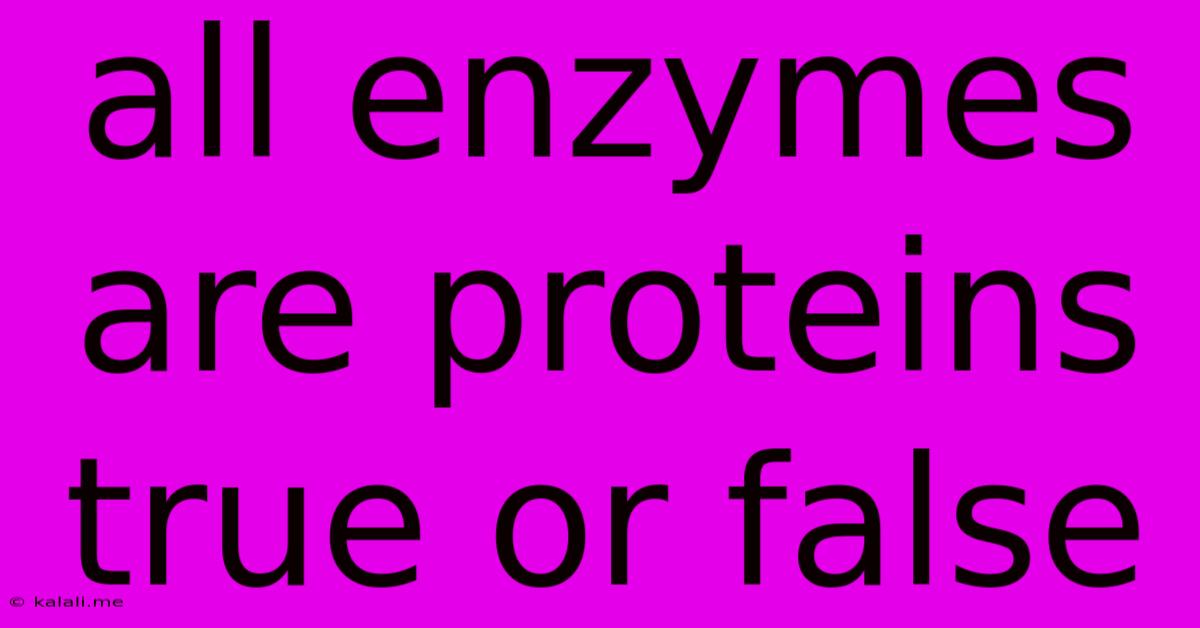All Enzymes Are Proteins True Or False
Kalali
May 10, 2025 · 3 min read

Table of Contents
Are All Enzymes Proteins? True or False?
The statement "All enzymes are proteins" is mostly true, but with important caveats. While the vast majority of enzymes are indeed proteins, a small but significant group of RNA molecules also exhibit catalytic activity, acting as enzymes. This discovery challenged the long-held belief that only proteins could function as biological catalysts.
This article will delve into the world of enzymes, exploring their structure, function, and the exceptions that prove the rule. We'll examine why proteins are so well-suited for enzymatic roles and how RNA molecules manage to perform similar functions. Understanding this nuanced truth is crucial for a comprehensive grasp of biochemistry and molecular biology.
The Predominance of Protein Enzymes
Proteins are incredibly versatile biomolecules due to their diverse amino acid composition and the resulting complex three-dimensional structures they can adopt. The unique sequence of amino acids dictates how a protein folds, creating specific pockets called active sites. These active sites are precisely shaped to bind to specific substrate molecules, facilitating chemical reactions with remarkable efficiency and specificity. This remarkable precision is a key characteristic of enzymatic activity. Many factors, such as pH, temperature, and the presence of cofactors, influence the activity of protein enzymes.
Several key features make proteins ideal for enzymatic roles:
- Diverse Amino Acid Side Chains: The variety of amino acid side chains allows for a wide range of interactions with substrates, enabling proteins to catalyze a vast array of chemical reactions.
- Precise Three-Dimensional Structure: The intricate folding patterns of proteins create specific active sites, ensuring high substrate specificity and catalytic efficiency.
- Ability to Undergo Conformational Changes: Many enzymes undergo subtle changes in their shape upon substrate binding, optimizing the catalytic process.
- Regulation Mechanisms: Protein enzymes are subject to various regulatory mechanisms, allowing cells to control their activity according to their needs. This includes allosteric regulation and covalent modification.
The Exception: Ribozymes – RNA Enzymes
The discovery of ribozymes, catalytic RNA molecules, revolutionized our understanding of enzymes. These RNA molecules, unlike protein enzymes, possess catalytic activity without the need for protein assistance. Ribozymes demonstrate that catalytic activity isn't solely a protein domain.
Examples of ribozymes include:
- RNase P: Involved in tRNA processing.
- Hammerhead ribozymes: Self-cleaving RNA molecules found in certain viruses and plants.
- Ribosomal RNA (rRNA): A crucial component of ribosomes, the protein synthesis machinery of the cell. rRNA plays a critical role in peptide bond formation, showcasing catalytic RNA's importance in a fundamental cellular process.
Conclusion: A More Accurate Statement
While the statement "All enzymes are proteins" is a common oversimplification used in introductory biology courses, a more accurate statement would be: "The vast majority of enzymes are proteins, but some RNA molecules also exhibit catalytic activity." Understanding the existence of ribozymes adds crucial nuance to our understanding of enzyme function and the fundamental processes of life. This clarifies the broader definition of enzymes as biological catalysts, highlighting the multifaceted nature of biological catalysis and expanding beyond the strictly proteinaceous view. Further research continues to unveil the complexities and diverse roles of both protein and RNA enzymes.
Latest Posts
Latest Posts
-
Is Dried Oregano A Pure Substance Or Mixture
Jul 04, 2025
-
What Is Fgteev Duddys Real Phone Number
Jul 04, 2025
-
What Are 2004 Pennies Worth Worlds Easyest Game
Jul 04, 2025
-
Who Did Alan Jackson Have An Affair With
Jul 04, 2025
-
How Much Is 500 Grams Of Ground Beef
Jul 04, 2025
Related Post
Thank you for visiting our website which covers about All Enzymes Are Proteins True Or False . We hope the information provided has been useful to you. Feel free to contact us if you have any questions or need further assistance. See you next time and don't miss to bookmark.